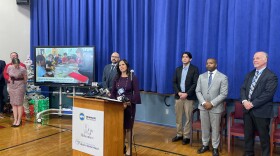There's a lot going on in Wisconsin politics — the COVID-19 vaccine rollout, funding for the businesses and workers who have been hurt by the pandemic as well as the political divisiveness among state lawmakers.
To unpack some of these issues, Lake Effect’s Joy Powers invited listeners to submit questions to ask Lt. Gov. Mandela Barnes to learn more about his and the governor’s work. Here are his answers:
What is the plan to distribute the federal COVID-19 relief funds Wisconsin is receiving from the latest stimulus package?
“We have about $500 million that’s coming in for specifically pandemic response, another $200 million for infrastructure and much of this is going to expanding broadband [internet] across the state, and then there’s $2.5 billion in economic recovery. And I’ll say that the $2.5 billion for economic recovery is going to invest in the well-being of families, workers, small businesses and also just communities across the state that are still trying to recover from the pandemic,” Barnes says.
As larger communities like Milwaukee get their own pot of money from the federal stimulus, how will the state stimulus work to help smaller communities?
Barnes says the funds to expand broadband will make sure that smaller, and especially rural, communities are able to access the internet. He says this is crucial as more health care providers are using telehealth to conduct visits and more businesses rely on the proper internet connections to sell their products.
“This is about making sure that businesses have the opportunity to compete, especially our small business, and there are dollars that are going to be going towards supporting and sustaining and uplifting our small businesses,” Barnes says.
When should Wisconsinites expect to see that money in their communities?
“That’s in the hands of the Treasury Department right now, but what I can say, when it’s all said and done, we are going to do exactly what we need to, to get these funds into the hands of businesses and communities as soon as possible,” he says.
How are you working to keep reduce Wisconsin’s prison population?
“There have been a number of provisions that have been made to make sure that we are reducing recidivism and with the governor establishing the Pardon Advisory Board,” Barnes says.
He acknowledges that there is more to be done and that this problem has existed for decades and says it can’t be solved in just two years.
“It’s going to take more than two years to take a U-turn on this issue but I’m incredibly excited about the work that we’ve been able to do but like I said, not celebrating yet because there’s nothing to celebrate until we get to a completely more just system when it comes to corrections,” Barnes says.
With reports of uncontrolled COVID-19 outbreaks in prisons and prisoners not having access to proper PPE or social distancing, how are you working to keep prisoners safe during the pandemic?
“The governor has been working with the Secretary of the Department of Corrections to make sure that safety is a priority. Were there issues? Yea probably, I’m not going to sit here and debate that. Things haven’t always been great but a lot of that is due to the fact that public health has been viewed in general,” he says. “If there are reports of more PPE shortages, especially in these sort of settings, we want to hear about it so we can change that.”
Barnes says that he and Gov. Evers are committed to doing everything they can to get PPE to anywhere that is having a shortage.
As a supporter of the legalization of marijuana, do you see a pathway to legalization in Wisconsin?
“The path is certainly there, and the resistance is pretty unfortunate. I remember two years ago when medical marijuana was in the state budget and the speaker said that this was just a roundabout way to get to full legalization, saying that it was a 'poison pill.' When he called it a 'poison pill,' I talked about the actual poison pills that are in communities, that prescription drugs that are getting people addicted and ravishing communities, tearing apart families. So when I look at something like marijuana legalization, this gives us an opportunity to join the 15 other states including, like you said, Michigan and Illinois that have fully legalized,” Barnes says.
Have a question for Lt. Governor Mandela Barnes? Submit it below. (Refresh the page if the module is not appearing)







